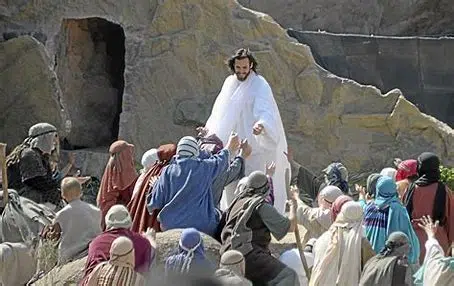
“25 Large crowds were traveling with Jesus, and turning to them he said:
“26If anyone comes to me and does not hate father and mother, wife and children, brothers and sisters—yes, even their own life—such a person cannot be my disciple. “
“27 And whoever does not carry their cross and follow me cannot be my disciple.
“28 “Suppose one of you wants to build a tower. Won’t you first sit down and estimate the cost to see if you have enough money to complete it?
“29 For if you lay the foundation and are not able to finish it, everyone who sees it will ridicule you, 30 saying, ‘This person began to build and wasn’t able to finish.’
“31 “Or suppose a king is about to go to war against another king. Won’t he first sit down and consider whether he is able with ten thousand men to oppose the one coming against him with twenty thousand?
“32 If he is not able, he will send a delegation while the other is still a long way off and will ask for terms of peace.
“33 In the same way, those of you who do not give up everything you have cannot be my disciples.”
Is Jesus really telling us to hate people? “First, he says: “Hate your father and mother, wife and children, brothers and sisters, yes and even life itself”. Really?
As we prepared to say our prayers of penitence this morning we were reminded of Jesus’ instructions to us about commandments: “Our Lord Jesus Christ said: The first commandment is this: ‘Hear O Israel, The Lord our God is the only Lord. You shall love the Lord your God with all your heart, with all your soul, with all your mind, and with all your strength. The second is this: ‘Love your neighbour as yourself.’ There is no commandment greater than these. On these two commandments hang all the law and the prophets.
I’m sure I am not the only one who feels confused by the apparent total contradiction between our readings and Jesus’ commandment declaration.
Love your neighbour as yourself but at the same time hate your father, mother, wife, children, brothers and sisters. When Jesus is asked: ‘who is my neighbour?’ He tells the parable of the good Samaritan with the implication in that homily being that everybody is our neighbour, even the stranger walking along the street. And when He is told that his family are waiting outside the synagogue to speak to him he denies them asking: ‘who is my mother, who is my brother?” So, does that mean that familial relationships are not considered in the same way as relationships with strangers? In today’s reading He tells us that as well as hating our earthly families we should also hate life itself. It’s all pretty strong stuff and It’s all just so confusing.
That is until we think about the reason Jesus was born in the first place. He was created as a challenge to humanity, as an example of what it means to love and be obedient to God.

For the disciple no one and no relationship can take precedence over the relationship with Jesus; not father and mother, wife and children, brothers and sisters, or life itself. We are expected always to put God first, before anybody and everybody; and everything we do in our lives should be dependent on Him and his will for us.
When I first came to faith, I really struggled with the idea of dying to self. What a strange concept – how does that work? Dying to self – makes absolutely no sense whatsoever! But it was a phrase that cropped up again and again and again until I realised that this was something I actually had to do – if I wanted to be a true disciple of Christ to follow His way then I needed to acknowledge that there was something in me that I needed to lose, something I needed to give up, something I had to be prepared to sacrifice. But what was it???? In today’s reading Jesus tells us we have to give up all our possessions if we are to be his disciple – good grief, that’s a big ask! And what am I supposed to do without owning anything? Where do I live, how do I eat, what about my telly and my laptop – even them????? Surely not!!! No, again, it is not a literal demand that we must give up all of our worldly goods in order to follow Jesus but what we must do is give up our dependence on them. My car is a vehicle that gets me from A to B but to some people their car is their pride and joy and almost a shrine to their position and achievement in life. This is where we get it so wrong our shrines shouldn’t be things, objects, or possessions, no we only need one shrine to worship and lavish all of our hearts, minds, souls and strength on and that is the one true God.
What about Jesus’ possessions? What possessions? The birds and animals of this world have more possessions than Jesus. “Foxes have holes, and birds of the air have nests; but the Son of Man has nowhere to lay his head,” Jesus tells us.
Again, Jesus is making the focus of his life his relationship with God not his relationship with things. It’s a question of priorities.
Jesus is asking us to do and be what he did and who he was. That’s what a disciple is. A disciple is a learner, one who learns to live, act, speak, and think like the teacher. The disciple integrates the teacher’s life and teachings into his or her own life.
Our learning to be like Jesus is not just another priority, one among many; it is to be the priority and this is where we need to die to self – we need to take off all those things that distract us from emulating all that Jesus is, we need to make our life’s focus His way and we need to be prepared to sacrifice everything in order to put God first in our lives and in our hearts and only when we do this will we be able to take up our cross and deliver ourselves to God’s will.